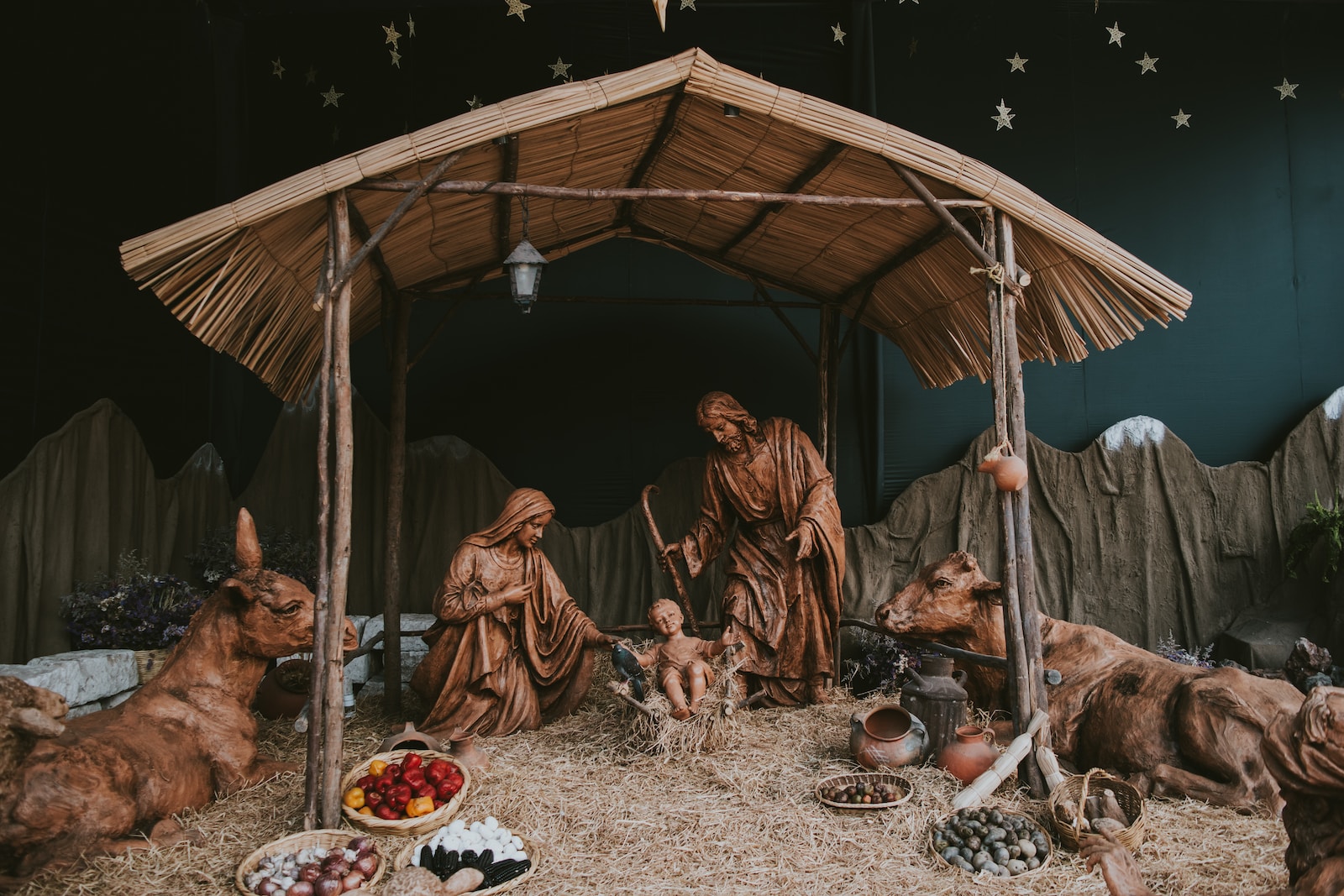Unveiling the Messianic, Prophetic, and Symbolic Connections in Numbers Chapter 7: Significance for Believers
An exploration of the messianic, prophetic, and symbolic connections between Numbers chapter 7 and Jesus and the gospel, highlighting practical applications for believers.
Overview of Numbers Chapter 7
The offerings brought by the twelve leaders of the tribes in Numbers chapter 7 hold significant messianic, prophetic, and symbolic connections to Jesus and the gospel. The twelve leaders brought dedication gifts to the tabernacle, one on each day for twelve days, signifying the unity and representation of the twelve tribes of Israel. This symbolic act foreshadows the coming of Jesus Christ, who would bring unity and representation for all believers, regardless of their background or heritage. The six covered carts and twelve oxen offered by the leaders also symbolize the provision and support necessary for the tabernacle, mirroring the support and provision that Jesus offers to His followers in their spiritual journey.
Furthermore, the experiences of the first and second generations of Israel in the wilderness, as reflected in Numbers chapter 7, serve as a powerful reminder of the consequences of obedience, rebellion, repentance, and the subsequent blessings or judgment. These experiences foreshadow the spiritual journey of humanity and the significance of obedience, repentance, and the ultimate blessing through Jesus Christ. Just as the Israelites faced the consequences of their actions, the chapter illustrates the need for believers to heed the call to obedience and repentance, and the promise of blessing and restoration through the gospel. This thematic emphasis underscores the timeless relevance of the chapter, serving as a poignant reminder for believers to navigate their spiritual lives with obedience and repentance, ultimately leading to the blessings found in Christ.
In Numbers chapter 7, the offerings brought by the twelve tribal leaders were not merely material gifts but were symbolic of Jesus’ ministry on earth and His ultimate sacrifice. For instance, the animals, silver, and gold offerings presented by each leader were reflective of the diverse facets of Jesus’ redemptive work. This symbolic connection underscores the profound nature of Jesus’ role as the ultimate sacrifice for the atonement of sin, shedding light on the gospel’s central message of salvation through Christ’s sacrificial death.
Moreover, the significance of the number seven in this context extends beyond mere numerical value. It symbolizes spiritual perfection and completion, aligning with the prophecy of the Messiah’s arrival. The use of the number seven in this chapter serves as a deliberate foreshadowing of the fulfillment of God’s redemptive plan through Jesus Christ, reinforcing the symbolic representation of Jesus and the gospel within the narrative of Numbers chapter 7. This symbolism deepens our understanding of the theological implications of the chapter, emphasizing its profound connection to the person and work of Jesus Christ, as well as the core tenets of the gospel message.
Messianic and Prophetic Symbolism
Numbers chapter 7 is rich with messianic and prophetic connections to Jesus and the gospel. The offerings brought by the twelve leaders of the tribes, including the six covered carts and twelve oxen, symbolize the dedication and surrender to God’s will, reflecting the obedience and submission to God’s plan that Jesus embodied during His earthly ministry. This offering can be seen as a foreshadowing of Jesus’ ultimate sacrifice and the surrender of His life for the redemption of humanity.
Furthermore, the chapter provides a prophetic representation of Christ through Balaam’s prophecy. Balaam, a non-Israelite prophet, foretold the coming of a “star” and a “scepter” out of Jacob, which is recognized as a messianic prophecy pointing to Jesus, who is often referred to as the “bright morning star” in the New Testament. This prophetic connection emphasizes the divine plan of salvation established long before Jesus’ earthly arrival, demonstrating the meticulous fulfillment of Old Testament prophecies through the life, death, and resurrection of Jesus Christ.
The messianic and prophetic connections found in Numbers chapter 7 have profound theological implications that extend beyond historical narratives. They offer practical applications for believers, encouraging them to trust in the faithfulness of God’s promises and to recognize the continuity between the Old and New Testaments. These connections also serve as a reminder of the enduring nature of God’s redemptive plan for humanity, inspiring believers to anchor their faith in the unchanging and prophetic truths revealed in Scripture.
Theological and Analytical Perspective
One of the most significant theological aspects of the messianic and prophetic connections in Numbers chapter 7 is the foreshadowing of the promised Messiah. The offerings brought by the twelve leaders of the tribes symbolize the unity and completeness found in Christ. Just as each leader brought the same offering, it reflects the universal nature of Jesus’ sacrifice for all people, regardless of their background or tribe. This foreshadowing emphasizes the inclusivity of the gospel message and the spiritual perfection found in Christ, as represented by the number seven.
Furthermore, the prophetic connections in Numbers chapter 7 are evident in the offerings themselves. The silver platter, silver bowl, and gold pan, as well as the animals and grain offerings, all point to the redemptive work of Christ. The silver and gold signify the purity and value of Jesus’ sacrifice, while the animals and grain offerings foreshadow the atonement and provision brought forth by the Messiah. This prophetic symbolism underscores the timeless significance of Jesus’ redemptive work, as it was prefigured in the offerings presented in Numbers chapter 7.
Additionally, from an analytical perspective, exploring the practical applications drawn from the messianic, prophetic, and symbolic connections in Numbers chapter 7 provides believers with a deeper understanding of the gospel’s relevance in their lives. Through this analysis, believers can discern the intricate threads of prophecy woven into the Old Testament, culminating in the fulfillment of these prophecies in the person of Jesus Christ. This understanding not only enriches their faith but also equips them to share the profound significance of the gospel with others, rooted in the timeless truths encapsulated in Numbers chapter 7.
Understanding the Number Seven
In Judaism and the Bible, the number seven carries deep symbolic meaning and significance. It is considered the Divine number of completion, fullness, and spiritual perfection. The use of the number seven in Numbers chapter 7 is not coincidental but purposeful, pointing to the spiritual perfection and fulfillment embodied in the messianic and prophetic connections to Jesus and the gospel. For example, the seven days of creation in the book of Genesis culminate in the completeness of God’s work, reflecting the essence of the number seven as a symbol of divine perfection and fulfillment.
Moreover, the practice of Sabbath, or resting every seventh day, is a significant aspect of the number seven. This practice is deeply tied to the fabric of the universe and represents the completion and fulfillment of God’s creative work, emphasizing the spiritual and metaphysical importance of the number seven. When we consider the messianic and prophetic connections in Numbers chapter 7, the significance of the number seven becomes even more pronounced, as it underscores the completeness and perfection of the divine plan of redemption found in Jesus Christ. The use of the number seven in the prophecy about the coming of the Messiah further solidifies its relevance and impact on the understanding of the messianic and prophetic connections in Numbers chapter 7, thereby enriching the theological and analytical perspectives of its symbolic representation.
Key Verses’ Significance
Key verses in Numbers chapter 7, specifically Numbers 6:24-26, 12:6-8, and 14:30-34, hold immense relevance to Jesus and the gospel. These verses encapsulate elements of blessing, divine communication, and the consequences of disobedience, all of which resonate with the overarching narrative of Jesus’ redemptive work and the foundational principles of the gospel.
Numbers 6:24-26 contains the priestly blessing which says, “The Lord bless you and keep you; the Lord make His face shine upon you, and be gracious to you; the Lord lift up His countenance upon you, and give you peace.” This blessing carries a profound connection to the gospel as it foreshadows the redemptive work of Jesus. The blessing of the Lord for His people to be kept, receive grace, and have peace finds its ultimate fulfillment in Jesus Christ, who offers spiritual protection, grace, and peace to all who believe in Him.
In Numbers 12:6-8, we encounter a direct account of God’s communication with Moses, Aaron, and Miriam. This passage highlights the unique relationship between God and Moses, foreshadowing the profound intercessory role that Jesus would later fulfill. Just as Moses interceded on behalf of the Israelites, Jesus intercedes for believers, bridging the gap between humanity and God, thereby illustrating the messianic connection in this passage.
Furthermore, Numbers 14:30-34 details the consequences of disobedience and unbelief among the Israelites. This passage serves as a powerful reminder of the consequences of rejecting God’s promises, a theme that finds its ultimate significance in the gospel. Jesus, as the promised Messiah, offers deliverance from the consequences of sin and unbelief, thereby fulfilling the prophetic connections found in this section of Numbers chapter 7.
Numbers Chapter 7 in Judaism
In Judaism, the significance of Numbers chapter 7 is amplified through the representation of Hebrew numbers by corresponding letters of the alphabet. This unique aspect adds a layer of depth to the understanding of the chapter’s symbolism and its connections to the messianic and prophetic narrative. For instance, the number seven, which is prominent in Numbers chapter 7, is considered the divine number of completion, fullness, and spiritual perfection in Judaism. This highlights the nuanced and profound spiritual truths that are interwoven into the fabric of this chapter, pointing to deeper meanings that transcend the literal text.
Moreover, the special meanings of numbers 1-7 in Judaism and the Bible provide a rich tapestry of symbolism that illuminates the significance of Numbers chapter 7. In Jewish tradition, each number carries its own metaphysical meaning and personality, contributing to the overall theological significance of the text. For example, the number one represents unity and the beginning, while the number three symbolizes equilibrium, stability, and perfection. These symbolic representations offer a glimpse into the intricate web of spiritual and theological significance that underpins the narrative of Numbers chapter 7, shedding light on its connections to Jesus and the gospel.
The association of Hebrew numbers with letters and their metaphysical meanings in Judaism not only enriches the understanding of Numbers chapter 7 but also serves as a testament to the timeless and universal nature of the spiritual truths contained in the text. This intricate web of symbolism and theological significance deepens the appreciation of the chapter’s messianic and prophetic connections, inviting believers to engage with its profound implications for understanding the gospel and the promised Messiah.
Practical Applications and Relevance Today
Understanding the practical applications of the messianic, prophetic, and symbolic connections in Numbers chapter 7 is crucial for believers in grasping the profound implications of Jesus’ redemptive work as foreshadowed in the Old Testament. One practical application is the recognition of the sacrificial offerings brought by the twelve leaders of the tribes, which symbolize the ultimate sacrifice of Jesus Christ for the redemption of humanity. This understanding can deepen believers’ appreciation for the significance of Jesus’ sacrifice and the atonement for sin, leading to a renewed commitment to living a life that honors and reflects this sacrifice.
Moreover, the theme of obedience, rebellion, repentance, and blessing found in the experiences of the first and second generations of Israel in the wilderness serves as a practical lesson for believers today. It highlights the consequences of disobedience and the abundant blessings that follow repentance and obedience to God. This provides a framework for believers to assess their own lives, evaluate their obedience to God’s commands, and seek repentance where necessary, leading to a deeper connection to the redemptive message of the gospel.
Additionally, the exploration of the number seven in the context of spiritual perfection and its connection to the prophecy about the coming of the Messiah can have practical implications for believers today. Understanding the significance of the number seven can inspire believers to strive for spiritual maturity and completeness in their faith journey, recognizing the profound symbolism associated with the number and its connection to the gospel message. This knowledge can encourage believers to pursue a deeper relationship with Christ and a more profound understanding of the spiritual perfection offered through Him, thus enhancing their spiritual growth and maturity in the present day[1, 4].
Conclusion
In conclusion, Numbers chapter 7 holds a significant place in the overarching narrative of the Bible, particularly in its connections to Jesus and the gospel. It serves as a testament to the deep-rooted messianic and prophetic significance woven into the fabric of the Old Testament, pointing towards the redemptive work of Christ. Through the offerings brought by the twelve leaders of the tribes, including six covered carts and twelve oxen, this chapter foreshadows the future coming of Jesus, emphasizing the theme of spiritual perfection and completion[3, 4].
Furthermore, the key verses in Numbers chapter 7, such as Numbers 6:24-26, 12:6-8, 14:30-34, reveal the intricate web of messianic and prophetic connections to Jesus and the gospel. These verses serve as a poignant reminder of the universal and timeless nature of biblical prophecy, offering believers a deeper insight into the redemptive plan of God throughout history.
By understanding the theological and analytical perspectives of the messianic and prophetic connections in Numbers chapter 7, believers can draw practical applications for their faith journey. This chapter not only provides a historical account but also presents an opportunity for believers to reflect on the spiritual implications of the messianic and prophetic symbolism, reinforcing their faith in the gospel of Jesus Christ as the ultimate fulfillment of God’s redemptive plan for humanity.



